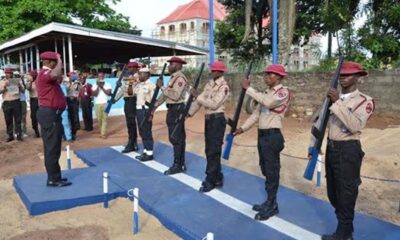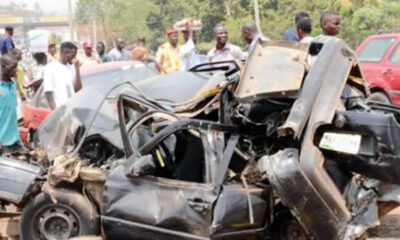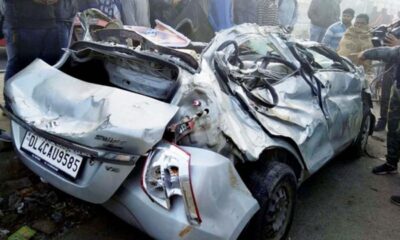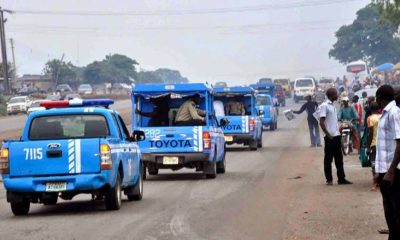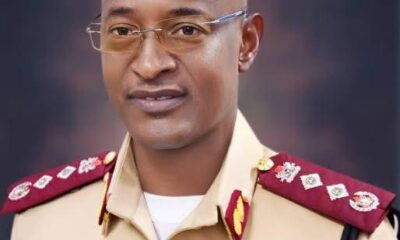Auto
Night travels, overloading our major headache – FRSC

Night travels, overloading our major headache – FRSC
The Federal Road Safety Corps (FRSC) says overloading and night travels have remained some of the problems confronting the agency.
Corps Marshal of the FRSC, Dauda Biu, said this in a statement on Sunday.
He was reacting to a June 02 accident along Kano-Ringim Road Kano State in which 18 people died and 12 others were injured.
Biu, a statement by the Corps Public Education Officer (CPEO) Assistant Corps Marshal (ACM) Bisi Kazeem, said the crash occured at 20:35hrs in Zakirai town, Kano-Ringim Road, and involved two commercial vehicles, a Volkswagen Sharon, overloaded with children and a Toyota bus also overloaded.
“To add to it, the Sharon engaged in dangerous and wrongful overtaking,” he added
Biu said that all hands must be on deck to ensure that overloading is reduced to the barest minimum, if not completely avoided.
The FRSC boss cautioned “motorists against dangerous overtaking, overloading and night travels across the country.”
The corps marshal also called for patience and collective vigilance on the roads to avoid unnecessary and unwarranted road accidents that could claim lives and properties.
He said the “FRSC is committed to ensuring safer road environments stating that adequate number of personnel and logistics are on the road for effective traffic management and rescue operations across the country.”
He also appealed to members of the public to contact the FRSC call centre through the toll-free line (122) in the event of a road crash and other emergencies for a prompt response.
He also said that all FRSC facilities remained open and functional to attend to members of the public.
Auto
Carloha announces Chery SUV gift for NAPE Charity Golf Tournament winner

Carloha announces Chery SUV gift for NAPE Charity Golf Tournament winner
Ultimate winner of the forthcoming NAPE Charity Golf Tournament holding in Abuja will drive home Chery Tiggo 8 Pro, a superlative sport utility vehicle.
Carloha Nigeria, one of the major sponsors of the event, disclosed this in a statement issued in Lagos.
The golf tournament is scheduled to take place at the prestigious IBB Golf & Country Club, Abuja, on October 26, 2024.
Carloha, franchise holder and assembler of Chery vehicles in Nigeria, said its sponsorship of the tournament was part of its commitment to fostering sports development in the country.
Part of the statement read, “Chery is offering its flagship SUV, the Tiggo 8 Pro as the ultimate prize for any player who achieves a hole-in-one during the tournament.
“This event promises to be an unforgettable experience for golf enthusiasts and those passionate about positively impacting our community.”
It specifically noted that the highlight of the tournament would be the incredible hole-in-one winning feat attracting a prize of Chery Tiggo 8 Pro generously provided by Carloha without insurance premium coverage for the tournament.
This prize is said to underscore Chery’s support for sporting initiatives in Nigeria and reflect the brand’s passion for nurturing talent and promoting community engagement through sports.
Director of Sales for Carloha Nigeria, Mr. Joseph Omokhapue, said, “We are glad to be one of the major partners in the NAPE Charity Golf Tournament, and offering an amazing prize for the hole-in-one with Tiggo 8 Pro represents Chery’s dedication to supporting sports in Nigeria, as well as enhancing the excitement and competitiveness of the tournament, making it an event to remember.
“More importantly, this gesture is one of the many ways Carloha is contributing to the underprivileged in our society by associating with the NAPE Charity Golf Tournament.”
By participating in this prestigious event, Golfers have the chance to showcase their skills and also contribute to a worthy cause.
Proceeds from the tournament would go towards supporting local charities, creating a lasting impact on the lives of those in need, the statement added.
The Tiggo 8 Pro, according to the firm, is renowned for its luxury, cutting-edge technology, stylish design, dynamic performance, and it perfectly embodies Chery’s dedication to excellence for on and off-road experience.
The Tiggo 8 Pro features an elegant, high-tech electronic gearshift system that provides effortless and precise control, enhancing safety performance and ease of operation, adeptly tailored for the diverse terrains of Nigeria.
It urged golfers and sports enthusiasts to get ready to swing for success at the NAPE Charity Golf Tournament.
“We look forward to seeing you at the IBB Golf Country Club as we come together to make a difference, promote sports development in Nigeria, and celebrate the Chery brand,” it stated.
As part of its commitment to make vehicle ownership easy and affordable for all, Carloha Nigeria offers a remarkable 6-year warranty/200,000 kilometers, 6-year free service on all Chery vehicles, a flexible auto financing solution with the best price for all vehicles, and 24/7 services and parts support nationwide.
This ensures that owners can enjoy their Tiggo 8 Pro with confidence, knowing they have reliable support and service from Chery for years to come.
Auto
NNPC to establish 40 new CNG stations nationwide
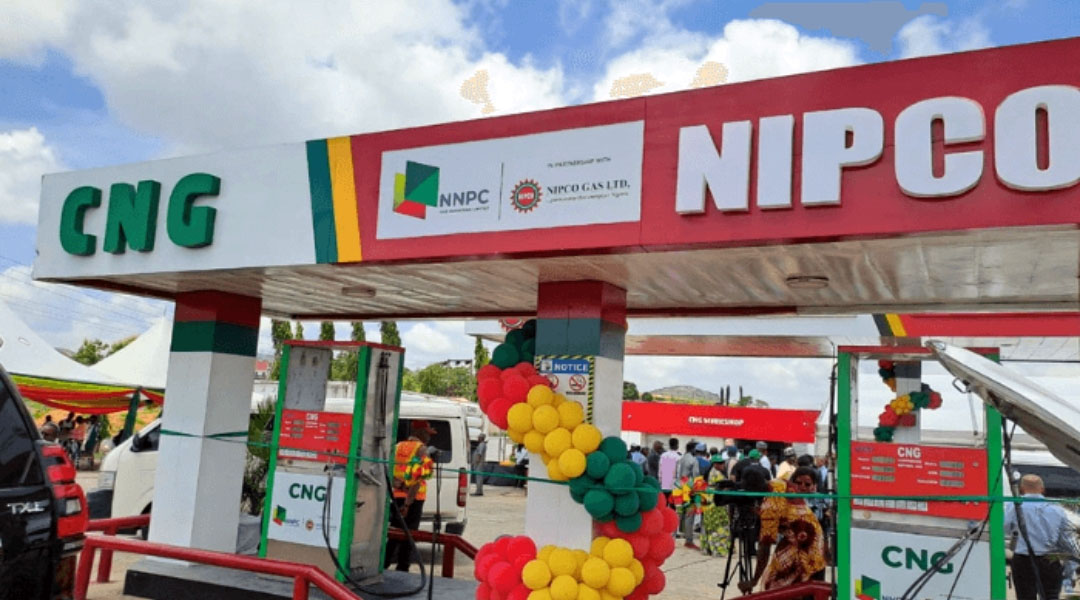
NNPC to establish 40 new CNG stations nationwide
The Nigerian National Petroleum Company (NNPC) has acquired equipment to establish 40 new Compressed Natural Gas (CNG) stations across the country, as part of efforts to expand CNG infrastructure.
This comes as the Federal Government aims to set up 100 CNG stations within six months.
Oluwagbemi Michael, Director of the Presidential CNG Initiative, revealed the plans during an event in Ogun State.
He noted that 12 CNG stations were set up in the past year, six in Abuja and six in Lagos, with further expansion underway.
READ ALSO:
- No more application fees for Lagos scholarship, bursary – Sanwo-Olu
- Lagos seals 352 churches, mosques, others for pollution
- Israel confirms killing Safieddine, likely successor to slain Hezbollah’s Nasrallah
This move follows concerns over the limited availability of CNG stations, which has slowed the adoption of CNG as an alternative to petrol.
Michael highlighted ongoing investments in infrastructure, including a recent N122bn funding for private companies involved in CNG distribution.
He also mentioned the government’s plan to distribute one million CNG conversion kits to commercial drivers, which is expected to increase demand and attract more investors to the sector.
Additionally, existing petrol stations are being upgraded to include CNG refuelling points, with 40 such upgrades planned by the NNPC.
NNPC to establish 40 new CNG stations nationwide
Auto
Updated: Exploded CNG car in Benin illegally converted, used fake parts – NIPCO, PCNGi

Updated: Exploded CNG car in Benin illegally converted, used fake parts – NIPCO, PCNGi
The Presidential CNG Initiative has said the car explosion that occurred on Wednesday at a filling station in Benin City, Edo State, was caused by illegal conversion of a petrol vehicle to run on Compressed Natural Gas (CNG).
The management of NIPCO Gas Limited also in a separate statement attributed the explosion at its CNG station in Benin to a fake and substandard CNG cylinder installed in the vehicle.
The newly retrofitted CNG-powered car exploded at the NIPCO filling station, causing panic in the area with many injured people rushed to the hospital.
Video footage circulating on social media shows the aftermath, with the vehicle severely damaged and people in the area rushing to assist the injured.
Comparing the high cost of petrol to cheaper CNG, about 70% is said to be saved running a vehicle on the CNG.
Findings by newstrends also show that conversion from petrol to CNG will cost ₦1.5 million, depending on the engine size.
READ ALSO:
- BREAKING: Senators pass vote of confidence on Akpabio
- Elon Musk donates $75m to support Trump’s presidential campaign
- CNG-powered vehicle explodes at filling station in Benin
PCNGi speaks
Reacting to the incident on Thursday, the Presidential CNG Initiative said on its X page, “The unfortunate incident involved an illegally modified vehicle at a NIPCO CNG Station at Ikpoba Hill in Benin City on Wednesday, October 16, 2024.
“The PCNGi commiserate with those injured in this avoidable incident, and is thankful that no lives were lost.”
NIPCO reacts
In a statement, NIPCO said, “The management of NIPCO Gas Ltd wishes to inform the general public of an incident that occurred at approximately 5:30 p.m. on Wednesday, October 16, 2024, at our Compressed Natural Gas (CNG) station located in Eyean, Benin City, Edo State.
“Our preliminary findings revealed that the explosion happened when a vehicle arrived for CNG refueling.
“Unfortunately, the cylinder installed in the vehicle was later identified as a fake, fabricated, substandard unit not designed for CNG.
“It exploded after being filled with just around 4 SCM of gas.
“The driver of the vehicle fled the scene immediately following the explosion. “While no fatalities were recorded, two individuals sustained injuries — one with a leg injury and another with an eye injury.
“Both victims were rushed to the hospital for medical attention, and one of them is scheduled for surgery at another facility, based on medical advice. Our team is ensuring that they receive the necessary care and treatment.”
-

 News2 days ago
News2 days agoFIRS announces recruitment of young graduates
-

 metro3 days ago
metro3 days agoUpdated: Army says reports of COAS Lagbaja’s death fake news
-

 metro2 days ago
metro2 days agoOluwo chased me out when I visited him – Ooni (VIDEO)
-

 News2 days ago
News2 days agoOsinbajo traitor, can’t talk about integrity – Reno Omokri
-

 metro2 days ago
metro2 days agoFani-Kayode: How my aide died in hotel after attending church
-

 Business1 day ago
Business1 day agoWe’re settling out of court with NNPC, others — Dangote
-

 metro2 days ago
metro2 days agoBREAKING : DSS replaces Tinubu’s chief security officer
-

 News2 days ago
News2 days agoYou can’t overrule Supreme Court on LG autonomy – Klinsmann tells Soludo

